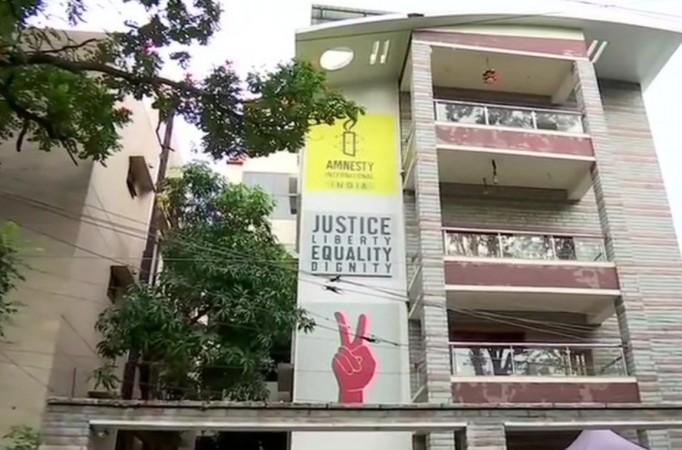Amnesty International Shutters Offices in India, Citing Government Attacks
HUMAN RIGHTS, 5 Oct 2020
Sameer Yasir and Hari Kumar | The New York Times - TRANSCEND Media Service
The organization’s premises have been raided and its bank accounts frozen. The actions, it says, are reprisals for criticizing the country’s human rights record.

Amnesty International offices in Bangalore, India, last year. In recent months, the group has published reports on the Delhi police’s role in fomenting anti-Muslim violence and on the use of torture in Kashmir. IBTimes India
29 Sep 2020 – The human rights organization Amnesty International said today that it had ceased its operations in India and laid off its entire staff in response to a series of government reprisals including the freezing of its bank accounts.
Amnesty said that the government of Prime Minister Narendra Modi had targeted the organization for years in response to its work exposing human rights violations in India. In recent months, the group has published reports on the Delhi police’s role in fomenting anti-Muslim violence and on the use of torture in Kashmir.
The Indian government said in a statement that the allegations from Amnesty were “unfortunate, exaggerated and far from the truth.” The organization has repeatedly violated local laws by circumventing the regulations under which foreign entities can receive donations from abroad, the government added.
“All the glossy statements about humanitarian work and speaking truth to power are nothing but a ploy to divert attention from their activities which were in clear contravention of laid-down Indian laws,” the statement said.
Amnesty International India denied the authorities’ accusation that the group had violated the country’s rules on foreign funding, which are intended to combat money laundering and which appear to be the pretext for the freezing of the accounts.
The government’s campaign against nongovernmental organizations, which Amnesty described as a “witch hunt,” had made fund-raising and operating effectively impossible, the group said. Amnesty has previously ceased operations in only one other country: Russia, in 2016.
“The continuing crackdown on Amnesty International India over the last two years and the complete freezing of bank accounts is not accidental,” the organization said in a statement, but was instead the result of the group’s “unequivocal calls for transparency in the government.”
Mr. Modi’s government began in 2014 to place restrictions on prominent charitable organizations, particularly those that sought foreign donations.
Officials in Mr. Modi’s Bharatiya Janata Party have denounced human rights and environmental activism as “anti-national.”
In 2018, the licenses of nearly 20,000 nongovernmental organizations were canceled by the Indian Home Affairs Ministry.
Many of those organizations were critical of Mr. Modi and raised questions about his role in the anti-Muslim riots in the western state of Gujarat when he was the chief minister there in 2002.
Previous governments, including those led by the opposition Indian National Congress party, have also been accused of targeting organizations critical of their policies. Nevertheless, opposition politicians used the moment to denounce Mr. Modi.
“India’s stature as a liberal democracy with free institutions, including media & civil society organizations, accounted for much of its soft power in the world,” Shashi Tharoor, a Congress party politician and former diplomat, wrote on Twitter. “Actions like this both undermine our reputation as a democracy & vitiate our soft power.”
Rajat Khosla, an Amnesty official, called the crackdown a “very worrying development.” He added that it was “also very saddening to see what is happening with the civil rights movements in India.”
Mr. Khosla said that his organization had been facing systematic intimidation by the government. It was only after an earlier court intervention that Amnesty had been temporarily able to use funds generated locally to run its operations, he added.
In recent months, the group has released reports on the complicity of the Delhi police in the March riots that killed at least 53 people, most of them Muslim.
It has also demanded the release of all political leaders, journalists and activists in Kashmir, as well as the restoration of all internet services in the restive region, which was recently stripped of its semiautonomous status.
Harsh Mander, an Indian human rights activist, said the government was targeting activists to crush the last dissenting voices in the country.
“This government is openly at war with the people at this moment,” Mr. Mander said. “They have chosen two targets: Muslims and dissenters.”
______________________________________________
Sameer Yasir reported from Srinagar, and Hari Kumar from New Delhi.
A version of this article appears in print on Sept. 30, 2020, Section A, Page 14 of the New York edition with the headline: Rights Group Leaves India, Citing Actions By Officials .
Tags: Amnesty International, Human Rights, India
DISCLAIMER: The statements, views and opinions expressed in pieces republished here are solely those of the authors and do not necessarily represent those of TMS. In accordance with title 17 U.S.C. section 107, this material is distributed without profit to those who have expressed a prior interest in receiving the included information for research and educational purposes. TMS has no affiliation whatsoever with the originator of this article nor is TMS endorsed or sponsored by the originator. “GO TO ORIGINAL” links are provided as a convenience to our readers and allow for verification of authenticity. However, as originating pages are often updated by their originating host sites, the versions posted may not match the versions our readers view when clicking the “GO TO ORIGINAL” links. This site contains copyrighted material the use of which has not always been specifically authorized by the copyright owner. We are making such material available in our efforts to advance understanding of environmental, political, human rights, economic, democracy, scientific, and social justice issues, etc. We believe this constitutes a ‘fair use’ of any such copyrighted material as provided for in section 107 of the US Copyright Law. In accordance with Title 17 U.S.C. Section 107, the material on this site is distributed without profit to those who have expressed a prior interest in receiving the included information for research and educational purposes. For more information go to: http://www.law.cornell.edu/uscode/17/107.shtml. If you wish to use copyrighted material from this site for purposes of your own that go beyond ‘fair use’, you must obtain permission from the copyright owner.

